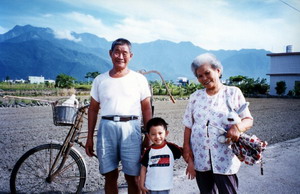Stone Dream
石頭夢

This film touches on the sensitive issues of national and ethnic identity in Taiwan. In 1965, Chen Yao-Chi directed the first objective Taiwanese documentary, Liu Pi-Chia. The main character, Liu Pi-Chia, was press-ganged into the Nationalist army in the 1940s in China, and came over to Taiwan with President Chiang Kai-Shek. After several decades, we unexpectedly met Liu in a village on the banks of the Mukua River. This new immigrant village consists of mainland veterans whose wives are from different ethnic groups, mostly Aborigines. Stones, the most important symbols of this film, link Liu Pi-Chia’s generation, who worked hard on the stony riverbed to reclaim land, and the new generation represented by Liu Pi-Chia’s son, whose hobby is collecting rose stones for artistic and economic purposes.
Directors
Hu Tai-Li
Hu Tai-li was a renowned documentary filmmaker, film festival programmer, and anthropologist in Taiwan. She was a research fellow and director at the Institute of Ethnology, Academia Sinica, as well as a concurrent professor at the Institute of Anthropology, National Tsing Hua University. She was also the president of Taiwan International Ethnographic Film Festival. She has directed and produced nine documentary films (The Return of Gods and Ancestors, Songs of Pasta’ay, Voices of Orchid Island, Passing Through My Mother-in-law’s Village, Sounds of Love and Sorrow, Encountering Jean Rouch, Stone Dream, After Passing, and Returning Souls).

